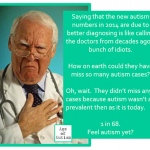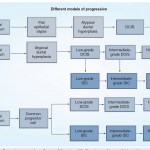Brain and Behavior
Ever since I first became aware of the antivaccine movement more than ten years ago, I’ve had little choice but to periodically pay attention to one of the godfathers of the antivaccine movement, Andrew Wakefield. Wakefield is the quack whose dubious case series that The Lancet foolishly published in 1998 launched a million antivaccine quacks. Ever since his disgrace, in which he was stripped of his U.K. medical license (or, as the lovely British phrasing goes, he was “struck off”), then later was pushed out by the board of directors at Thoughtful House and had his Lancet paper retracted…
A recent article published in the American Journal of Physiology reviewed how the brain regulates feeding behaviors. Humans are not the only species to eat food in spurts we like to call meals. Research suggests that this behavior may actually aid survival as it reduces exposure time to the environment and makes responding to fluctuations in the availability of food a bit easier to deal with. Dr. Marise Parent and colleagues at Georgia State University wanted to find out how your body determines when to initiate eating as well as how long the interval between meals should be.…
Childhood lead poisoning is one of those health risks that everyone has likely heard about, but many probably think it’s a problem of the past. However, a recent study reminds us that in just one state — Michigan — the effects of childhood lead poisoning cost about $330 million every year. And that’s a conservative estimate.
But estimating the cost of childhood lead poisoning wasn’t the only goal of the study, which was released earlier this week. Study author Tracy Swinburn, a research specialist at the University of Michigan Risk Science Center, wanted to know what kind of financial return…
We all know about Mike Adams, notorious quack, conspiracy theorist, quantum dork, and raving nutball around here, right? If nothing else, you must have enjoyed Orac's regular deconstruction of his nonsense.
Jon Entine has published a profile of Mike Adams in Forbes magazine that distills all the lunacy down to a relatively concise summary. For instance, it documents his recent public obsessions.
Adam’s latest crusade: the world’s governments are covering up the fact that the doomed Malaysian Airlines jetliner was pirated safely to a desert hideaway by Iranian hijackers, and is now…
Here I am, sitting on the balcony of my hotel room in sunny San Diego, as I get ready to head over to the 2014 meeting of the American Association for Cancer Research (AACR). The sun is rising over the mountains, and the only sound I hear is that of running water in the swimming pool below (well, that and traffic around the convention center, the odd siren, and the noise of air conditioner fans), and I need to produce something quick for the blog. Realizing that last week, I described myself as having fallen into a "rut," not because I thought my posts were substandard but rather because I…
As I just mentioned a week ago, there used to be a time when I dreaded Autism Awareness Month, which begins tomorrow. The reason was simple. Several years ago to perhaps as recently as three years ago, I could always count on a flurry of stories about autism towards the end of March and the beginning of April about autism. That in and of itself isn't bad. Sometimes the stories were actually informative and useful. However, in variably there would be a flurry of truly aggravating stories in which the reporter, either through laziness, lack of ideas, or the desire to add some spice and…
Our future is at risk. The science is settled, in the main, though there are many details to continue to work out and there are unknowns. But no one doubts that business as usual release of fossil carbon into the atmosphere mainly as the greenhouse gas Carbon Dioxide spells big trouble for humanity and the planet Earth, including eventual massive sea level rise and highly disruptive changes in the Earth’s climatology that will make a mess of many things including our food supply. Think failed state. Think Syria. Now, think failed planet, Syria over half the globe, the other half merely a mess…
The latest issue of the Journal of Public Health Policy includes an interesting piece by Linda Richter and Susan E. Foster of the organization CASAColumbia about "changing the language of addiction." (The journal is open access during the month of March; the home page is here.) They note that while the science of addiction has advanced, outdated public attitudes about it persist and interfere with effective treatment. Surveys have found adults, and even many physicians, to consider alcohol addiction to be at least partially a personal or moral weakness. Stigmatizing addiction can interfere…
Solar cells made with bismuth vanadate achieve a surface area of 32 square meters per gram. This compound can be paired with cheap oxides to split water molecules (and make hydrogen) with record efficiency.
Short-term geoengineering could postpone global warming, only to have it happen more quickly in the future.
Carotenoids tinge blackbird bills a deep orange, signalling fitness; birds with oranger bills are "are heavier and larger, have less blood parasites and pair with females in better condition than males with yellow bills."
Fibroblasts can extrude a tidy biological…
Most people infected with mosquito-borne West Nile virus don’t experience any symptoms at all. However, the tiny percentage of cases that do end up in the hospital total hundreds of millions of dollars in medical costs and lost productivity.
Published earlier this week in the American Journal of Tropical Medicine and Hygiene, researchers estimated that the cumulative cost of reported hospitalized cases of West Nile virus between 1999 and 2012 totaled $778 million. The study is the first to examine the economic burden of West Nile on infected patients who were hospitalized with conditions such…
Kevin Drum and Aaron Carroll report on a new study of the effect of new grocery stores opening in "food deserts" in poor neighborhood. The study is paywalled, so I can't speak to the whole thing, but both of them quote similar bits making the same point: no statistically significant effects on the BMI of people in the neighborhood, and very few signs of healthier eating in general.
This is one of those studies that probably belongs in the Journal of "Well, Yeah...", because it doesn't surprise me a bit. Not for reasons that can be addressed via policy measures-- Drum quotes the study saying "…
Antivaccinationists irritate me, for reasons that should be obvious to regular readers. The reason is that vaccine-preventable diseases can kill. Contrary to the beliefs of many nonvaccinating parents, who downplay these diseases as being not particularly dangerous, they are dangerous. Of these, one of more dangerous vaccine-preventable diseases is pertussis. That's why a story that popped up in my Facebook feed disturbed me so. Unsurprisingly, it's on that other wretched hive of scum and quackery (with respect to vaccines), Mothering.com:
So, my almost ten month old started coughing and…
It’s probably my earliest public health memory — the image of Surgeon General C. Everett Koop and his grandfatherly beard on the television warning my elementary school self about the dangers of smoking. He was the first doctor I knew by name.
But while Koop may be the surgeon general that people of my generation most likely associate with the public health movement to reduce smoking, he wasn’t the first to speak out against tobacco. Koop was carrying on a legacy that began decades before with the nation’s ninth surgeon general, Luther Terry, who on Jan. 11, 1964, released the first surgeon…
By Stacy Jannis
Kavli Science Video Contest Manager
The Kavli Science in Fiction Video Contest challenges Gr 6-12 students to examine the science in fiction, including science fiction movies, TV shows, and games. Our contest advisors include science educators , scientists, and Hollywood scifi visual effects experts.
Steven Schlozman, M.D. is an assistant professor of psychiatry at Harvard Medical School and a staff child and adult psychiatrist at Massachusetts General Hospital in Boston, MA. He is also the co-director of Medical Student Education in Psychiatry for Harvard Medical School. His…
Razib Khan poked me on twitter yesterday on the topic of David Dobbs' controversial article, which I've already discussed (I liked it). I'm in the minority here; Jerry Coyne has two rebuttals, and Richard Dawkins himself has replied. There has also been a lot of pushback in the comments here. I think they all miss the mark, and represent an attempt to shoehorn everything into an established, successful research program, without acknowledging any of the inadequacies of genetic reductionism.
Before I continue, let's get one thing clear: I am saying that understanding genes is fundamental,…
Catching Fire is apparently a very popular book and/or movie that everyone is very excited about. But Catching Fire: How Cooking Made Us Human is a different a book about some interesting research I was involved in about the origin of our genus, Homo.
You can pick up a copy of our paper on this page. We call it "The Cooking Hypothesis." The basic idea can be summarized with these points:
1) Cooking food transformed human ecology. Many potential foods in the environment can't be consumed by humans (or apes in general) without cooking. But adding cooking to our species-specific technology,…
Warning: here be spoilers
In many latter-day zombie movies, books, and TV shows, zombie-ism has a biological cause. In 28 Days Later, the infection is caused by the "Rage" virus, which escaped from a lab when animal rights activists break in and release a group of infected chimpanzees. Of course, one of the animals promptly bites one of its "liberators," and the infection spreads rapidly throughout Great Britain. In Zombieland, it's a mutated form of "mad cow" disease. The Crazies, it's the Trixie virus; World War Z, the Solanum virus; Resident Evil, the T virus. I could go on and on.…
Can we replace Classroom Chaos with Learning-Centered Education?
K–12 education can be better. One of the most effective changes that could be made is to reduce the amount of chaos in the classroom and replace it with learning.
I spend several hours a year in various schools giving presentations on Anthropology, Evolution, Brainzz, and other topics. Plus, I know some teachers and have taught seminars specifically for teachers. For these reasons I have a sense of what happens in high school (and to a lesser extent middle school and elementary school) classrooms. What I am about to describe…
Blogging is a rather immediate endeavor. Over the last nine years (nearly), I've lost track of how many times I saw something that I wanted to blog about but but by the time I got around to it was no longer topical. Usually what happens is that my Dug the Dog tendencies take over, as I'm distracted by yet another squirrel, although sometimes there are just too many targets topics and too little time. Fortunately, however, sometimes the issue is resurrected, sometimes in a really dumb way, such that I have an excuse to correct my previous oversight. This is just such a time, and the manner in…
A recent article published in The Scientist about the use of robots to study animal behavior is a must-read! I had no idea this was such a seemingly common use of robots. Some researchers use them to mimic the movements of ants along paths of least resistance. While others have developed robots to study cockroaches, rodents, birds, squirrels, frogs, fish, bees, etc. Researchers study the robots in the lab or field to see how well they mimic the real thing or to understand how robotic animals and real animals interact. By studying robots, researchers often learn about the constraints an…








